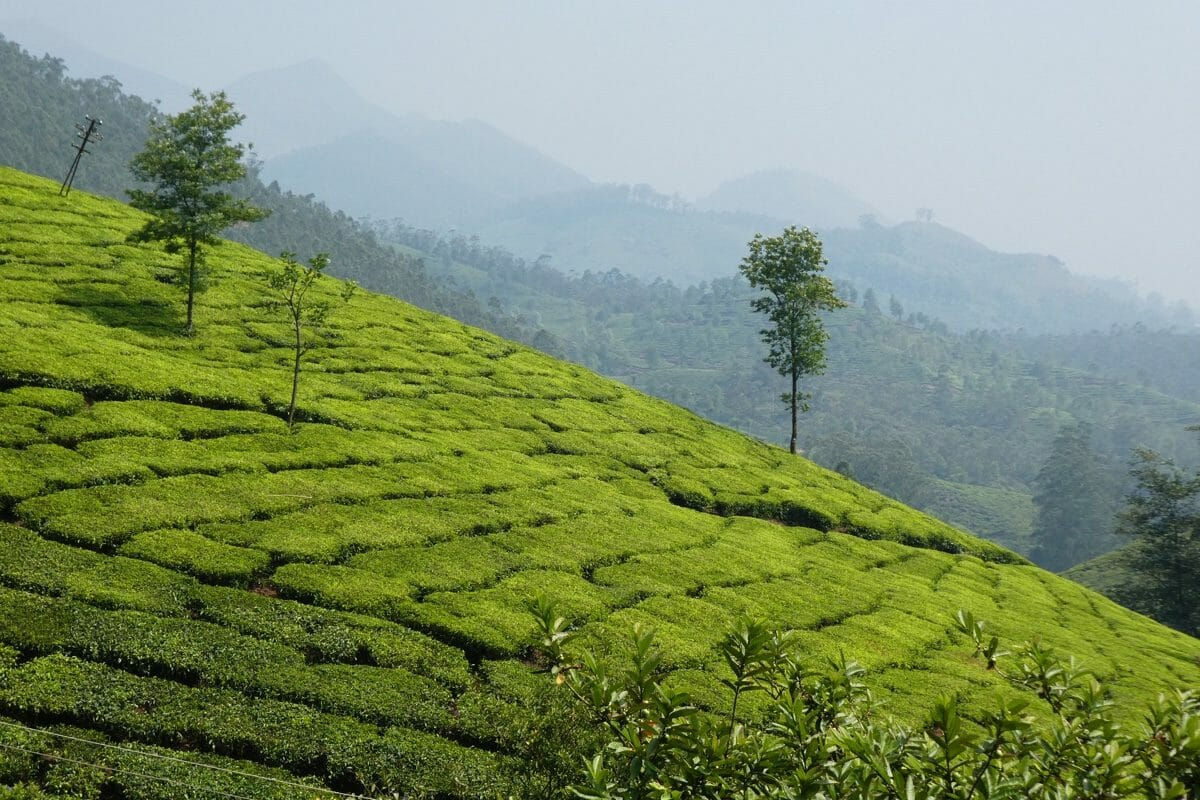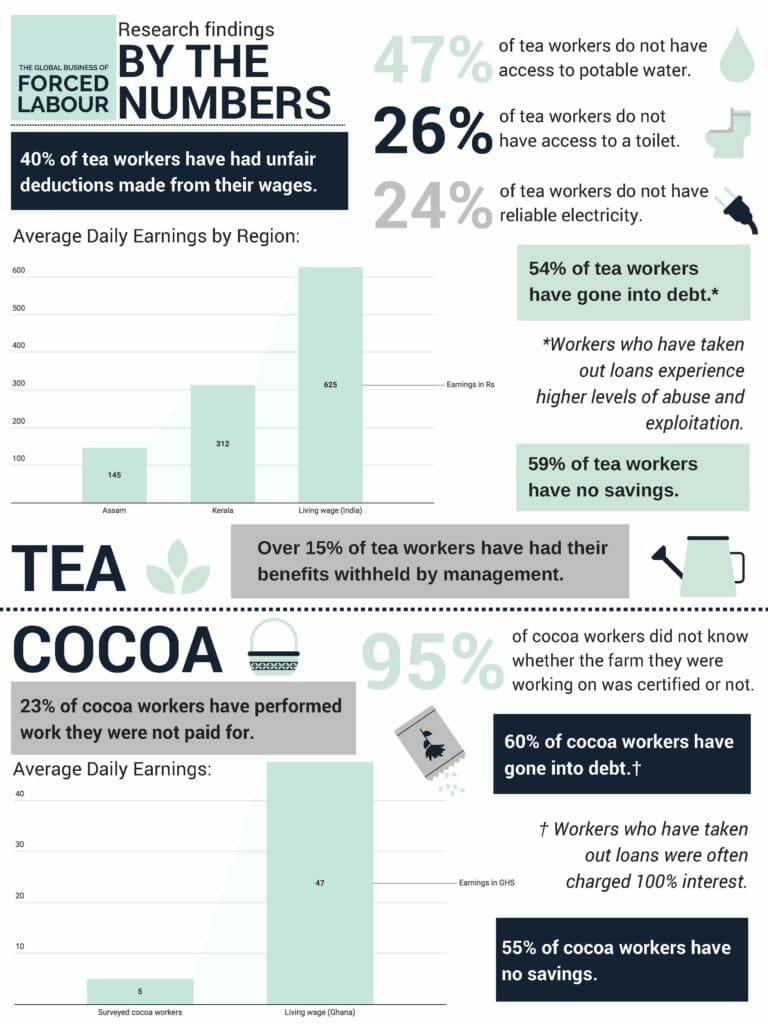Labor Conditions on Tea and Cocoa Farms Are Not Good
Even certified farms were hardly admirable.
Labor Conditions on Tea and Cocoa Farms Are Not Good
Even certified farms were hardly admirable.

A two-year study, titled The Global Business of Forced Labor, took a look at the labor situations for two of the world’s biggest suppliers of two of the world’s biggest crops: tea in India, and cocoa in Ghana. The results paint a very scary picture of abuse, underpayments, poverty, and abysmal quality of life for farmworkers. According to the study: “There are widespread patterns of labour abuse in tea and cocoa supply chains feeding UK markets. Low prices and irresponsible sourcing practices create high profits for retail and brand firms but this creates a strong and systemic business ‘demand’ for cheap and forced labour.”
Over those two years, the researchers behind the study (led by Genevieve LeBaron at the University of Sheffield) interviewed more than 120 farmworkers and surveyed over 1,000 more, spanning a variety of levels of farm, including some which are certified by third-party auditors, like the Rainforest Alliance. India is the U.S.’s third-biggest supplier of tea, and Ghana is fifth in supplying cocoa products. (That latter stat is probably a little skewed; Canada, which does not grow cocoa, is the biggest cocoa supplier, largely of finished chocolate products.)
The findings are deeply concerning. Widespread reports of abuse – physical, sexual, verbal, debt bonding – pairs with a common inability to provide adequate wages or housing. Tea farmworkers in India are as low as 25 percent of the national poverty line, and cocoa farmworkers in Ghana are around 30 percent of Ghana’s. Huge proportions of farmworkers have been paid late or have had wages unfairly withheld; nearly half of the farmworkers surveyed do not have consistent access to safe drinking water.
Where things get really scary is in the certification process. Consumers of tea and cocoa often have limited knowledge of the circumstances around the cultivation of those crops – do you know where your Maxwell House is grown? – and therefore rely on third-party auditors like Fairtrade, Rainforest Alliance, and Ethical Trade Partnership. The survey included farms that are certified by these companies, but the labor conditions were hardly improved. From the study: “In the tea industry little difference was found in labour standards, including wage levels, between certified and non-certified tea plantations, with certified plantations faring worse than non-certified plantations against some indicators of labour abuse and unfair treatment.”
Almost all of the workers did not know whether their farm was certified or not, and thus were unable to know what sorts of treatment they were entitled to. In addition, there were reports of workers being told to work in a certain way for the inspectors, and then to abandon those patterns when the inspectors had left.
You can read the full report here.

Follow us

This work is licensed under a Creative Commons Attribution-NoDerivatives 4.0 International License.
Want to republish a Modern Farmer story?
We are happy for Modern Farmer stories to be shared, and encourage you to republish our articles for your audience. When doing so, we ask that you follow these guidelines:
Please credit us and our writers
For the author byline, please use “Author Name, Modern Farmer.” At the top of our stories, if on the web, please include this text and link: “This story was originally published by Modern Farmer.”
Please make sure to include a link back to either our home page or the article URL.
At the bottom of the story, please include the following text:
“Modern Farmer is a nonprofit initiative dedicated to raising awareness and catalyzing action at the intersection of food, agriculture, and society. Read more at <link>Modern Farmer</link>.”
Use our widget
We’d like to be able to track our stories, so we ask that if you republish our content, you do so using our widget (located on the left hand side of the article). The HTML code has a built-in tracker that tells us the data and domain where the story was published, as well as view counts.
Check the image requirements
It’s your responsibility to confirm you're licensed to republish images in our articles. Some images, such as those from commercial providers, don't allow their images to be republished without permission or payment. Copyright terms are generally listed in the image caption and attribution. You are welcome to omit our images or substitute with your own. Charts and interactive graphics follow the same rules.
Don’t change too much. Or, ask us first.
Articles must be republished in their entirety. It’s okay to change references to time (“today” to “yesterday”) or location (“Iowa City, IA” to “here”). But please keep everything else the same.
If you feel strongly that a more material edit needs to be made, get in touch with us at [email protected]. We’re happy to discuss it with the original author, but we must have prior approval for changes before publication.
Special cases
Extracts. You may run the first few lines or paragraphs of the article and then say: “Read the full article at Modern Farmer” with a link back to the original article.
Quotes. You may quote authors provided you include a link back to the article URL.
Translations. These require writer approval. To inquire about translation of a Modern Farmer article, contact us at [email protected]
Signed consent / copyright release forms. These are not required, provided you are following these guidelines.
Print. Articles can be republished in print under these same rules, with the exception that you do not need to include the links.
Tag us
When sharing the story on social media, please tag us using the following: - Twitter (@ModFarm) - Facebook (@ModernFarmerMedia) - Instagram (@modfarm)
Use our content respectfully
Modern Farmer is a nonprofit and as such we share our content for free and in good faith in order to reach new audiences. Respectfully,
No selling ads against our stories. It’s okay to put our stories on pages with ads.
Don’t republish our material wholesale, or automatically; you need to select stories to be republished individually.
You have no rights to sell, license, syndicate, or otherwise represent yourself as the authorized owner of our material to any third parties. This means that you cannot actively publish or submit our work for syndication to third party platforms or apps like Apple News or Google News. We understand that publishers cannot fully control when certain third parties automatically summarize or crawl content from publishers’ own sites.
Keep in touch
We want to hear from you if you love Modern Farmer content, have a collaboration idea, or anything else to share. As a nonprofit outlet, we work in service of our community and are always open to comments, feedback, and ideas. Contact us at [email protected].by Dan Nosowitz, Modern Farmer
June 4, 2018
Modern Farmer Weekly
Solutions Hub
Innovations, ideas and inspiration. Actionable solutions for a resilient food system.
ExploreExplore other topics
Share With Us
We want to hear from Modern Farmer readers who have thoughtful commentary, actionable solutions, or helpful ideas to share.
SubmitNecessary cookies are absolutely essential for the website to function properly. This category only includes cookies that ensures basic functionalities and security features of the website. These cookies do not store any personal information.
Any cookies that may not be particularly necessary for the website to function and are used specifically to collect user personal data via analytics, ads, other embedded contents are termed as non-necessary cookies.